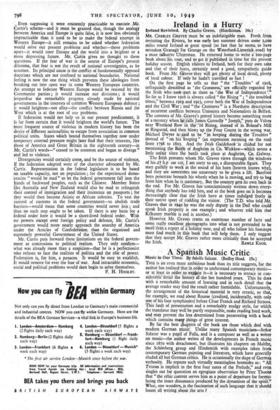Panacea for Peace
World Revolution in ,the Cause of Peace. By Lionel Curtis. (Basil Blackwell 7s. 6d.)
AMERICAN leaders in 1787—so runs Mr. Curtis's argument—solved North America's fuffdamental problem by deciding to transfer responsibility for keeping the peace from sovereign State govern- ments to the American people as a whole' through the medium of a Federal Constitution. They succeeded because they effected the transfer in one fell swoop, rejecting the policy of effecting a union between the State governments by gradual stages. A civil war, it is true, was necessary to complete the revolution ; but better, that than accept certain failure by attempting the other policy of "incipient and creeping union." This other policy has since been tried in the British Commonwealth, where it has failed to bring about a closer union. It is now being followed again by the British Government in connection with United Europe. It will fail again ; for it tries to preserve the obsolete and defective system of national sovereignties. Instead of this we must follow the American lesson. The existing sovereign governments in Western Europe must be sidestepped and the task of preventing war transferred to the peoples by a federal constitution. This would be the next step in the "world revolu- tion." If we take it other countries will join, and we shall remove the fear of war. There is no other way of removing that fear.
Even supposing it were eminently practicable to execute Mr. Curtis's scheme—and it must be granted that, though the analogy between America and Europe is quite false, it is now less obviously impracticable than it used to be to snake the federal attempt in Western Europe—it still remains to be asked whether federation would solve our present problems and whether—those problems apart—it would steer Europe and the world into a brighter or a more depressing future. Mr. Curtis gives no thought to these questions. If the fear of war is the source of Europe's present dilemma, that fear is not the result of national sovereignties, as he assumes. Its principal cause is the conflict of fundamentally opposed doctrines which are not confined to national boundaries. National feeling is now the one thing which prevents these ideologies from breaking out into open war in some Western European countries. An attempt to federate Western Europe would be resisted by the Communist parties ; it would increase our divisions ; it would jeopardise the remarkable progress already made by national governments in the interests of common Western European defence ; it would heighten—not allay—the conflict between Russia and the West which is at the root of our problems.
If federation would not help us in our present predicament, it is far from certain that it would brighten the world's future. The most frequent source of violence in modern history has been the desire of 'different nationalities to escape from association in common political units. States which bound themselves together now under temporary external pressure might later find that their interests, like those of America and Great Britain in the eighteenth century—in Mr. Curtis's words—" ceased to be common and began to diverge" and led to violence.
' Divergencies would certainly come and be the source of violence' if the federation adopted were of the character advocated by Mr. Curtis. Representation in the federal legislature is to be based an taxable capacity, not on population ; for the experienced demo- cracies "would be mad" to let the federal government fall into the hands of backward peoples, such as the Chinese. Member States like Australia and New Zealand would also be mad to relinquish their control of immigration and their insistence on passports ; for they would then become Asiatic or African colonies. To vest the control of customs in the federal government—to abolish trade barriers—would mean that some countries would never join ; and thus no such step ought to be taken. If there is any basis for a federal order here it would be a short-lived federal order. With no powers except over foreign policy and defence, Mr. Curtis's government would more nearly approach the anarchy of America under the Articles of Confederation than the organised and supremely powerful Government of the United States.
Mr. Curtis puts forward these limitations on the federal govern- ment as concessions to political realism. They only confirm— what was already more than a suspicion—that he is a perfectionist who refuses to face the realities of politics and the role of power. Federation is, for him, a panacea. It would be easy to establish. It would remove for ever the fear of war. And intractable economic, social and political problems would then begin to solve themselves.
F. H. HINSLEY.



































 Previous page
Previous page